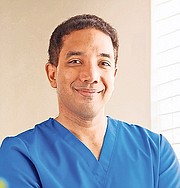By DR GREGGORY PINTO
April is Testicular Cancer Awareness Month. The importance of self-awareness and education regarding testicular cancer is going to be stressed during this month, particularly for men under 40 years of age.
Testicular cancer is relatively rare. There are about 9,000 cases of testicular cancer in the United States every year.
Men in general have about a 0.4 percent chance of developing testicular cancer in their lifetime. About one in 250 men will develop cancer of the testicles in their lifetime; whereas about one in six men will develop prostate cancer in their lifetime.
It is, however, the most common cancer found in men between the ages of 15 and 40 years old, when few expect to be afflicted by the disease.
Testicular cancer makes up about on percent of cancers in all men but it accounts for 13 percent of cancers in men age 15 to 40 years old. The average age at diagnosis is 33 years old.
There are several misconceptions regarding testicular cancer; it is not caused by wearing tight underwear or by frequent masturbation.
Risk factors
The risk factors of testicular cancer include a first-degree relative having a history of testicular cancer or a personal history of testicular cancer involving the other testicle; the occurrence of an undescended testicle that is not surgically treated by age 13; material exposure to certain toxins or hormones during pregnancy; reduced sperm formation; infertility and certain gene mutations, and hypospadias, which is a congenital abnormality of the penis and urethra.
Caucasian men have a much higher incidence of testicular cancer than men of African ancestry. Being white is a risk factor for testicular cancer.
Studies have shown, however, that men of African ancestry usually present for treatment at a more advanced stage than their Caucasian male counterparts.
Almost all testicular cancers originate in the germ cells.
There are two main types of germ cell tumours: seminomas and non-seminomas.
Seminomas have an excellent prognosis for cure and there is no poor prognosis even when there is advanced spread of the seminoma cancer throughout the body.
Non-seminoma testicular cancer has a slightly less promising but still a very good cure rate.
Non-seminomas usually are more aggressive and spread more rapidly than seminomas. Testicular tumours may have a non-seminoma and seminoma component, mixed germ cell tumours, and they are treated as non-seminomas. Seminomas are more sensitive to radiation.
Rarer forms of testicular cancer include lymphomas, rhabdomyosarcomas, or even rarer, metastatic spread from another primary cancer.
As with all cancers, early diagnosis leads better cure rates. Most germ cell testicular tumours have a 99 percent five-year survival rate when diagnosed at an early stage.
Fear, embarrassment, or at times ignorance, often leads men to hide or ignore signs of a testicular cancer.
Men often mistake early signs of testicular cancer with a wrongly self-diagnosed sexually transmitted disease and there is often a prolonged delay in seeking the attention of an urologist.
Some 90 percent of testicular cancers are painless and usually present as a pea or marble-sized small mass in one or rarely both testicles. Men with testicular cancer often experience a vague heaviness on the affected side of their testicle or an increase in fluid around the affected testicle and they may have breast enlargement or pain. Advanced prostate cancers may present with abdominal pain or back pain, possible enlarged lymph nodes in the neck and lung metastasis that could present with shortness of breath, cough, or chest pain.
Cancer of the testicles can spread to the lymph nodes around the aorta, the main artery of the body. Advanced cancer of the testicles could lead to a deep vein thrombosis, usually of the legs which present with pain and swelling, but less commonly the upper limbs may be affected.
Early diagnosis of testicular cancer does not require regular visits to your urologist or routine screening blood tests; it simply involves men doing self testicular exams in the shower for example, once a month.
If a man detects an abnormality then promptly seek the confidential opinion of an urologist.
Early diagnosis could mean a straightforward outpatient curative surgery versus advanced testicular cancer requiring often multiple surgeries with chemotherapy and radiation therapy.
How to do a self testicular exam
Take hold of your testicle between your thumbs and forefingers and then gently roll it, feeling for lumps and masses. Then repeat the process for the other side. In the shower the warmth and humidity relaxes your scrotum and makes the process easier.
Any change in size, consistency, texture of the testicle or if lumps or masses are felt, should initiate a prompt visit to an urologist.
An urologist would start with a thorough history then a physical exam and imaging of the testicles with an ultrasound may be ordered with a staging CT scan or MRI scan.
There are specific testicular tumour markers blood tests that may be taken that may be elevated depending on the type of testicular cancer. These testicular tumour marker blood tests are not routine screening tests but specific blood tests requested only when there is an abnormal physical exam or abnormal imaging result.
Do not let fear, embarrassment or misconceptions lead to you or someone that you love being diagnosed with advanced testicular cancer.
Self monthly testicular exams are the key, along with the willingness to seek immediate, confidential and compassionate urology care when any concerns present themselves.
• Dr Greggory Pinto is a board certified Bahamian urologist and laparoscopic surgeon trained in South Africa, Germany and France. He can be reached at Urology Care Bahamas at the Surgical Suite, Centreville Medical Centre, #68 Collins Avenue/Sixth Terrace, Nassau. Call (242) 326-1929, e-mail: welcome@urologycarebahamas.com, or visit the website at www.urologycarebahamas.com.





Comments
Use the comment form below to begin a discussion about this content.
Sign in to comment
Or login with:
OpenID